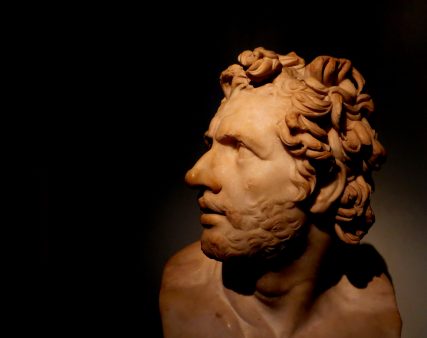Putting Academic Skepticism to Work
29 July 2019
The Academic Skeptics were philosophers who modeled themselves on Socrates and his method of questioning. When the Delphic Oracle reported that no one was wiser than him, Socrates reasoned that whatever wisdom he had was to be found in his recognizing that he does not know many important things. And so he does not pronounce on those things or take himself to be an expert on things he is not. Plato memorialized Socrates’ methods of revealing ignorance in his dialogues, and in the Academy he founded, those methods were further developed (along with other strategies for establishing knowledge). Two later heads of the Academy, Arcesilaus and Carneades, brought these critical Socratic methods to the fore. And with this, they inaugurated a skeptical Academy.
The primary Academic method is opposing arguments with others, setting them in dialectical opposition. And so, to Stoic claims that there are kataleptic impressions (impressions that are true and could not be like any false impression), the Academics argued for a variety of indiscernibility cases (dreams, madness, deception by the gods, twins, and so on). And to the Epicurean claim that all sense impressions are true, the Academics proposed a variety of variance cases (bent oars in water, things that look fuzzy when far away, the difference between people’s perceptions). This strategy generalizes so that for any domain of dispute, reasons for and against can be marshalled, and the arguments and counter-arguments may be many levels deep. Cicero’s philosophical dialogues are exemplary of this method – learned representatives of a variety of views arrange their arguments and have substantive exchanges. To each argument, there is a counter-argument.
This method of arguing pro-and-con for the issues of import, and in particular mastering the arguments of one’s opposition, was not a mere rhetorical exercise or gesture of contrariety. Instead, the Academics, and Cicero in particular, saw it as a method of inquiry. In the Tusculan Disputations, Cicero explains that it is not for the sake of being merely disputatious that Academics oppose all arguments, but for the sake of identifying what’s worth believing, what resembles the truth once all the considerations are aired (1.8). Arguing against every position, even the ones you hold dear, is the best way to understand the issue, to manage one’s orientation toward what the dispute is about. Knowing and being able to state the best and most challenging objections to and compelling reasons for not only your view but the relevant competitors is the objective.
This is a familiar aspiration, as it is championed later (and famously) by J. S. Mill, but there is a unique procedural rule the Academics remind us to follow. It is stated by Cicero as “it is unfair, in critique, to omit to mention the advantages of the view or institution in question, but enumerate only disadvantages and particular shortcomings” (On the Laws 3.23). The rule is that in arguing pro-contra, we must resist the temptation of comparing the vices of one view with the virtues of its competitor. Instead, we must compare the virtues and virtues, the vices and vices. Think of so many critical exchanges wherein a favored view receives from one side attention only on its positive features, and the competing view only on the negative. This is a rigged game – instead, we must deliberate between the advantages and drawbacks aligned. In this way, when we compare views, when we choose what looks like the most promising proposal, when we look for the most plausible option, we do so with our eyes open about the comparative virtues and drawbacks alike for all the views. We do this with the procedural rule: compare virtues to virtues, vices to vices.
Skepticism, generally, has its costs as a philosophical program, and Academic skepticism has them in bundles. The primary cost is that after the procedure of comparison, one’s beliefs are regularly shaken. One does not have the confidence one originally had. And consequently, one may not act as confidently as one had before. Philosophy affects your life, and the complaint is that skepticism shuts one’s life down. It may be a theoretically exemplary program, but skepticism, as the objection goes, is practically disastrous.
The Academics were keenly aware of this challenge, and they had two ready replies. The first was that this method may put knowledge and the confidence that comes with taking oneself to know out of our reach, but it puts us in a position of understanding, which, though not the primary intellectual good, is a good of consequence. In fact, skepticism, when seen properly, is a kind of intellectual achievement, instead of failure – one has a command of the issue that most disputants don’t have. That’s not nothing, and most skeptics agreed with Socrates that wisdom resides there.
The second reply is that the method of arguing pro-contra and the rule of comparison do not guarantee that all debates will yield perfect stalemate between the two (or more) sides. One side may have a slight dialectical advantage in one area or another. The initial plausibility of a view may be undercut by the objections against it, but it may have the least objectionable problems of the competitors. Or a view may remain appealing despite all the problems one must manage to maintain it. That’s possible as an outcome, and in fact a regular result of many exchanges has this feature. We may emerge from these exchanges with the commitments we began them with, but our relationship with them has changed – we can see them as flawed, but improvable, commitments, ones that are worth sticking with for now. Cicero, himself, despite identifying as an Academic skeptic, regularly sides with the Stoics after these exchanges. Most famously, he offers an endorsement of Stoic theology after its significant critique at the end of On the Nature of the Gods. The intellectual modesty promoted by the skeptical methods does not preclude commitment, but it does restrict that commitment to something tentative and revisable. The Academics had a procedure for running debates, comparing criticisms and support for views, and ultimately making judgments. What was necessary, of course, was freedom for representatives of those views to voice them and the freedom for those assessing the state of dialectical play at the end to judge as they saw fit.
Skepticism is regularly portrayed as a kind of intellectual poison, something that destroys inquiry and action. The Academics and their method provide a model for inquiry and judgment, but it requires that we accept that our beliefs may not survive critical reflection. That’s unpleasant medicine, for sure, but it is a far cry from poison.
Photo: Greek Hero by Scott F. Aikin
- October 2025
- September 2025
- August 2025
- July 2025
- June 2025
- May 2025
- April 2025
- March 2025
- February 2025
- January 2025
- December 2024
- November 2024
- October 2024
- September 2024
- August 2024
- July 2024
- June 2024
- May 2024
- April 2024
- March 2024
- February 2024
- January 2024
- December 2023
- November 2023
- October 2023
- September 2023
- August 2023
- July 2023
- June 2023
- May 2023
- April 2023
- March 2023
- February 2023
- January 2023
- December 2022
- November 2022
- October 2022
- September 2022
- August 2022
- July 2022
- June 2022
- May 2022
- April 2022
- March 2022
- February 2022
- January 2022
- December 2021
- November 2021
- October 2021
- September 2021
- August 2021
- July 2021
- June 2021
- May 2021
- April 2021
- March 2021
- February 2021
- January 2021
- December 2020
- November 2020
- October 2020
- September 2020
- August 2020
- July 2020
- June 2020
- May 2020
- April 2020
- March 2020
- February 2020
- January 2020
- December 2019
- November 2019
- October 2019
- September 2019
- August 2019
- July 2019
- June 2019
- May 2019
- April 2019
- March 2019
- February 2019
- January 2019
- December 2018
- November 2018
- October 2018
- September 2018
- August 2018
- July 2018
- June 2018
- May 2018
- April 2018
- March 2018
- February 2018
- January 2018
- December 2017
- November 2017
- October 2017
- September 2017
- August 2017
- July 2017
- June 2017
- May 2017

